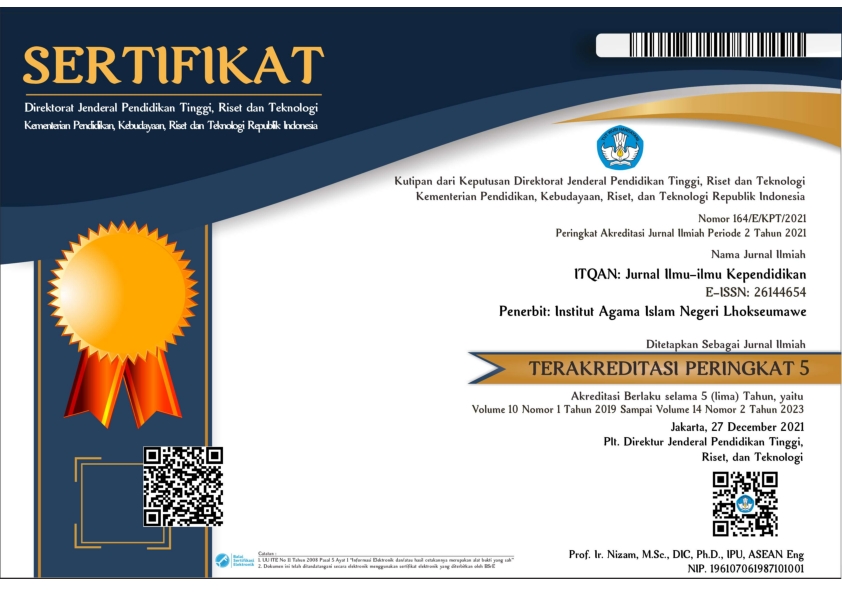Manajemen Strategi Kepala Sekolah dalam Membangun Budaya Organisasi di SMP IT Luqmanul Hakim Aceh Besar
Main Article Content
Muhammad Ilham
Aulia Rahmat
The goal of this study is to describe and comprehend the principal of SMP IT, Luqmanul Hakim, in terms of organizational culture development and implementation. The methodology employed is a qualitative one with a descriptive focus. Three individuals at SMP IT Luqmanul Hakim served as data sources for this study: the principal, the head of administration, and a teacher in the field of study. Observation, interviewing, and documenting procedures are used to collect data. The data analysis process included data reduction, data display, and conclusion drafting. The findings of this study indicate that the principal's strategy for fostering organizational culture is to make work commitments, establish regular management, assign primary work to each teacher and employee, frequently direct teachers and employees, choose teachers with good character and who adhere to school regulations, direct teachers and students in fostering morals, etiquette, and manners, acclimating students to dhuha prayer, and including dhuha prayer in the curriculum. The principal's strategy for implementing organizational culture is to communicate the primary objectives and responsibilities to each teacher, as well as to conduct weekly training and recitations, as well as to supervise and control each teacher and student to ensure that they are aware of the school environment's conditions.
Akdon. (2011). Strategic Management for Educational Management. Bandung: Alfabeta.
Arsyad, J., & Arfah, H. (2020). Modernization of Professional Development of Islamic Education Teachers in Indonesia. ITQAN: Jurnal Ilmu-Ilmu Kependidikan, 11(2), 111–137.
Ashkanasy, N. M., Wilderom, C. P. M., & Peterson, M. F. (2010). Handbook of Organizational Culture 7 Climate. California: Sage Publication.
Brahmasari, & Suprayetno. (2008). Pengaruh Motivasi Kerja, Kepemimpinan dan Budaya Organisasi terhadap Kepuasan Kerja Karyawan serta Dampaknya pada Kinerja Perusahaan (Studi kasus pada PT. Pei Hai International Wiratama Indonesia). Jurnal Manajemen Dan Kewirausahaan, 10(2).
Brooks, M. C., & Mutohar, A. (2018). Islamic School Leadership: a Conceptual Framework. Journal of Educational Administration and History, 50(2), 54–68. https://doi.org/10.1080/00220620.2018.1426558
Burhanuddin, B. (2019). The Scale of School Organizational Culture in Indonesia. International Journal of Educational Management.
Dull, M. (2010). Leadership and Organizational Culture: Sustaining Dialogue between Practitioners and Scholars. Public Administration Review, 70(6), 857–866.
Fattah, N. (2013). Analisis Kebijakan Pendidikan (2nd ed.). Bandung: Rosda Karya.
Fullan, M. (2012). Leadership & Sustainability. System Thinkers in Action. Thousand Oaks: Corwin Publisher.
Hendricks, J. W., & Payne, S. C. (2007). Beyond the Big Five: Leader Goal Orientation as a Predictor of Leadership Effectiveness. Human Performance, 20(4), 317–343.
Irawan, I. (2019). Manajemen Peningkatan Mutu Sekolah Islam. ITQAN: Jurnal Ilmu-Ilmu Kependidikan, 10(2), 91–100.
Mardiyah, M. (2012). Kepemimpinan Kiai dalam Memelihara Budaya Organisasi di Pondok Modern Gontor, Lirboyo Kediri, dan Pesantren T ebuireng Jombang. Tsaqafah, 8(1), 67–104.
McCarley, T. A., Peters, M. L., & Decman, J. M. (2016). Transformational Leadership related to School Climate. Educational Management Administration & Leadership, 44(2), 322–342. https://doi.org/10.1177/1741143214549966
Nawawi, H. (2012). Manajemen Strategik, Organisasi Non Profit Bidang Pemerintahan (4th ed.). Yogyakarta: UGM Press.
Prasetyo, M. A. M. (2019). Sistem Pasar Output Pendidikan Islam. At-Ta’dib: Jurnal Ilmiah Prodi Pendidikan Agama Islam, 10(2), 136–153.
Prasetyo, M. A. M., & Anwar, K. (2021). Assessing Organizational Culture: An Important Step for Enhancing the Implementation of Junior. AL-Ishlah, 13(1), 646–659. https://doi.org/10.35445/alishlah.v13i1. 461
Sayidah, N., Ady, S. U., Supriyati, J., Winedar, M., Mulyaningtyas, A., & Assagaf, A. (2019). Quality and University Governance in Indonesia. International Journal of Higher Education, 8(4), 10–17.
Sihotang, R. B., & Zebedeus, Z. V. (2013). Relationships between Total Quality Management Practices, Organizational Culture and Teacher’s Performance: Study from Seventh Day Adventist High Schools in West Indonesia. International Research Journal of Business Studies, 6(2), 105–119.
Susanto, A. B. (2018). A Strategic Management Approach, Coorporate Culture & Organization Culture. Jakarta: The Jakarta Consulting Group.
Tanjung, R., Hanafiah, H., Arifudin, O., & Mulyadi, D. (2021). Kompetensi Manajerial Kepala Sekolah Dalam Meningkatkan Kinerja Guru Sekolah Dasar. JIIP - Jurnal Ilmiah Ilmu Pendidikan, 4(4), 291–296. https://doi.org/10.54371/jiip.v4i4.272
Thapa, A., Cohen, J., Guffey, S., & Higgins-D’Alessandro, A. (2013). A Review of School Climate Research. Review of Educational Research, 83(3), 357–385.
Tribus, M. (2010). Total Quality Management in education. In Developing quality systems in education. https://doi.org/10.4324/9780203423660_chapter_5
Van Knippenberg, D., & Stam, D. (2014). Visionary Leadership. The Oxford Handbook of Leadership and Organizations, 241, 259.



